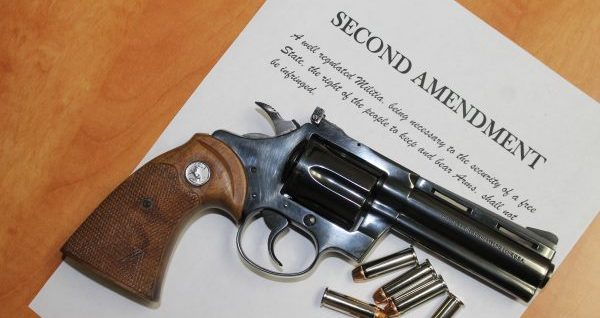
UPDATED, 7:20 P.M. 9/5/17: Hurricane Irma, with its strongest-ever-recorded sustained wind speed of 185 mph, may pale in comparison to the fury that appears to be building among American gun owners following reports that the governor of the U.S. Virgin Islands has signed an emergency order allowing the seizure of “arms, ammunition…and other property” as the storm bears down on the islands.
Liberty Park Press contacted the U.S. Department of Justice in an effort to determine whether this might violate the Second Amendment of the U.S. Constitution, but could not get a definitive answer. It may violate federal statute passed in 2006.
Twelve years ago, in the wake of Hurricane Katrina hitting New Orleans, the National Rifle Association and Second Amendment Foundation joined forces to stop the confiscation of firearms by police and National Guard units. After that landmark case, several states adopted provisions that prohibited gun confiscation or suspension of gun rights in the wake of emergencies under so-called “emergency powers” laws.
“We would have thought the aftermath of Hurricane Katrina taught government officials a lesson about confiscating property in the wake of a disaster,” said Alan M. Gottlieb, SAF founder and executive vice president.
“Following Katrina, we went to federal court and successfully stopped illegal gun seizures by authorities in New Orleans,” he recalled.
In the wake of that case 12 years ago, several states and the Congress passed legislation prohibiting such an exercise of emergency power.
“The constitution applies to the U.S. Virgin Islands,” Gottlieb said. “If necessary we will take legal action against the governor’s order.”
NRA’s Chris Cox, executive director of the Institute for Legislative Action, said the order “violates the constitutional rights of law-abiding citizens and puts their lives at risk.” He called the order “dangerous.”
NRA recalled that Congress passed legislation prohibiting the confiscation of legal firearms during emergencies. It was signed in 2006 by then-president George W. Bush.
The Daily Caller has posted a link to the order, signed Monday by Virgin Islands Gov. Kenneth Mapp. In that order, Adjutant General Deborah Howell was authorized “to take whatever actions she considers necessary to carry out the assigned mission” of maintaining and restoring public order.” Here is part of the text of Gov. Mapp’s order:
“I direct, authorize, and order the Adjutant General of the Virgin Islands to mobilize such units of the National Guard as are necessary to maintain or restore public order, and to guarantee the safety of life and property. To include the maintenance of order and security throughout the Territory, until such time as she is ordered by me, verbally and/or in writing to stand down from such mobilization which shall be on the termination date of this Order as set forth. During the performance of these duties, members of the Virgin Islands National Guard shall have the powers designated in Title 23, Sections 1521 and 1552, Virgin Islands Code and the rights and protections granted by Title 23, Section 1517, 1523, 1524, 1525, 1553 and 1555, Virgin Islands Code. The adjutant General is directed pursuant to Title 23, Section 1520, Virgin Islands Code to take whatever actions she considers necessary to carry out the assigned mission. In accordance with Title 23, Section 1522, Virgin Islands Code, The Adjutant General is authorized and directed to seize arms, ammunition, explosives, incendiary material and any other property that may be required by the military forces for the performance of this emergency mission, in accordance with the Rules of Force promulgated by the Virgin Islands National Guard and approved by the Virgin Islands Department of Justice.”
According to Wikipedia, the U.S. Virgin Islands are classified by the United Nations as a “non-self-governing territory and are currently an organized, unincorporated United States territory.”
The four-paragraph order took effect at 12:01 a.m. Tuesday as Hurricane Irma appeared to be bearing down on the Virgin Islands, Puerto Rico, the Dominican Republic and other islands southeast of Florida, where the storm might also make landfall.
Much was written in the wake of the New Orleans gun confiscation, including one book that detailed the events. Many legal scholars weighing in on the SAF/NRA court case concluded that New Orleans officials were in the wrong. No official was ever held responsible for issuing the order that only law enforcement would be armed. Then-Mayor Ray Nagin was blamed for the confiscation order.